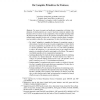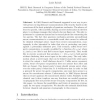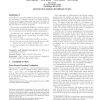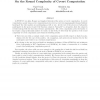310 search results - page 13 / 62 » An Efficient Protocol for Fair Secure Two-Party Computation |
TCC
2010
Springer
15 years 8 months ago
2010
Springer
Abstract. For secure two-party and multi-party computation with abort, classification of which primitives are complete has been extensively studied in the literature. However, for...
118
click to vote
AC
1998
Springer
15 years 3 months ago
1998
Springer
Abstract. In 1982, Bennett and Brassard suggested a new way to provide privacy in long distance communications with security based on the correctness of the basic principles of qua...
CONCUR
2003
Springer
15 years 4 months ago
2003
Springer
Abstract. A contract signing protocol lets two parties exchange digital signatures on a pre-agreed text. Optimistic contract signing protocols enable the signers to do so without i...
PODC
2004
ACM
15 years 5 months ago
2004
ACM
Secure function evaluation (SFE) enables a group of players, by themselves, to evaluate a function on private inputs as securely as if a trusted third party had done it for them. ...
STOC
2010
ACM
15 years 4 months ago
2010
ACM
In STOC’05, von Ahn, Hopper and Langford introduced the notion of covert computation. In covert computation, a party runs a secure computation protocol over a covert (or stegano...




